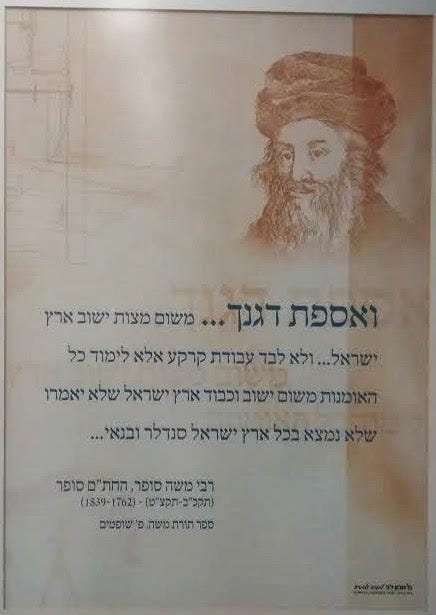The Evils of Civic Responsibility and National Pride?

A rabbinic colleague of mine recently purchased a Hebrew illustrated children's haggadah, Me-Avdut LeCherut, published by Yefeh Nof, to study with his youngest child. The copyright page includes a "hechsher" - an emblem announcing that it is a "kosher sefer," under the "Committee for the Kashrus of Books" established by a Machon Eshnav in Bnei Brak. The copyright page further includes not only the name of the "Torah editor," but also the person involved in the "Spiritual Oversight" (pikuach ruchani). Each of the cartoon illustrations, we are told in the introduction, brings to life various lessons that are taught in Torah sources.
With all this stress on the theological kashrus of the material, you'd expect it to be a very "safe" book. But my friend got to the first page, illustrating the cruelty of the slavery in Egypt, and was horrified. As am I.

The Egyptians are depicted as evil taskmasters with whips, maliciously lashing their Jewish slaves. But the statements they are uttering are not about how the Jews must suffer undue hardships and suffering. Rather, they are about basic civil responsibility - in particular, the statements commonly uttered in contemporary Israeli discourse. "You need to contribute to the state," says one taskmaster, "not just study Torah all day." And another Egyptian, with a snarl on his face as he raises his whip, says, "There needs to be an equal sharing of the burden!" The Hebrew phrase used, shivayon be'netel, is the phrase instantly recognizable to all Israelis as referring to the need for all Israeli communities, including charedi communities, to share the burden of supporting the economy and serving in the IDF.

I'm not sure which is worse - that an ostensibly super-kosher haggadah for children is pushing a hardline political worldview, or that the editors think that civic responsibility represents the evil of Ancient Egypt. I'll bet that children educated with such messages would guess that phrases such as "Shall your brethren go to battle, while you remain here?" were coined by evil Amalekites like Yair Lapid, rather than by Moshe Rabbeinu. Even the charedi Mishpacha magazine published an article by Jonathan Rosenblum stating that we all need charedim to get academic education and professional employment, for the sake of funding the IDF as well as supporting the economy. Rosenblum is clearly fighting an uphill battle, when children are being taught that civic responsibility is an evil Egyptian concept.
But even Mishpacha is hardly teaching good lessons about being part of a nation. In a recent column, Eytan Kobre condemns people feeling national pride in Israel's accomplishments in entrepreneurship, scientific discovery and innovation, economic strength, and sports. He bases this off a wild expansion of a statement by Rav Saadia Gaon that “Ein umaseinu umah ela b’Toroseha — Our nation is not a nation other than by virtue of its Written and Oral Torahs.” In fact, the original Arabic refers to the commandments rather than the Torah, and Rav Saadiah is merely establishing why the commandments are always binding. But Kobre takes it much further:
"Nothing other than our possession of the Torah plays any role in our national character, nothing whatsoever. Not a common land, language, and culture."
Apparently Kobre has forgotten about much of Sefer Bereishis and the first part of Shemos, in which we are established as a nation, descended from the forefathers, with a unique culture (and perhaps even a unique language), and in which we receive a promise of inheriting the Land of Israel. All of these are certainly a role in our national character, and they were all before we received the Torah.
Kobre continues:
"Not winning four games, or 15, in a baseball competition. Not ranking on some non-Jew’s list as the world’s eighth-strongest power. Not being a world leader in hi-tech R&D or entrepreneurship or 21st century Nobel Laureates. Not even boasting one of the world’s best-trained and equipped fighting forces. Of course, we should hope and pray that Israel’s economy thrives, and feel great when it does — and thank the Reason for it, too. That means Jews will have parnassah. Of course we need to be able to defend ourselves against the wolves that encircle us. But there’s a world of difference between feeling good that Jews are secure and have parnassah, and one’s heart swelling with national pride and feelings of 'we’ll show them…' "
Rabbi Sholom Gold has already penned an open letter with a harsh and devastating critique of Kobre. There are an abundance of explicit pesukim in Tanach which state precisely the opposite of Kobre's claim - verses which clearly demonstrate national pride in military and economic achievements. Which makes it particularly amusing/tragic that Kobre claims to be explicating "the most important truth in all of human history, one that echoes off the pages of every book in Tanach." Has he ever even read Tanach?!

But you don't need to go back to the Bible to see how Kobre is perverting Judaism. We have a much more recent and "charedi" source: none other than Chasam Sofer, the founding father of ultra-Orthodoxy. He declares that in the Land of Israel, one does not only work the fields in order to make a living. There is also the mitzvah of yishuv ha'aretz, settling the land. In the same way as one stops learning Torah to put on tefillin, says Chasam Sofer, one stops learning Torah to farm the land, which is the mitzvah of yishuv ha'aretz. Chasam Sofer explains that yishuv ha'aretz does not just mean living in the Land of Israel; it means developing the country. He further says that not just farming, but all industries and professions, are part of settling the land and giving it honor - which includes concern about how it is perceived by the rest of the world.
Whether it's with children's' comics or supposedly sophisticated adult op-eds, the charedi community clearly has a long way to go in understanding the traditional Torah importance of civic responsibility and national pride.


